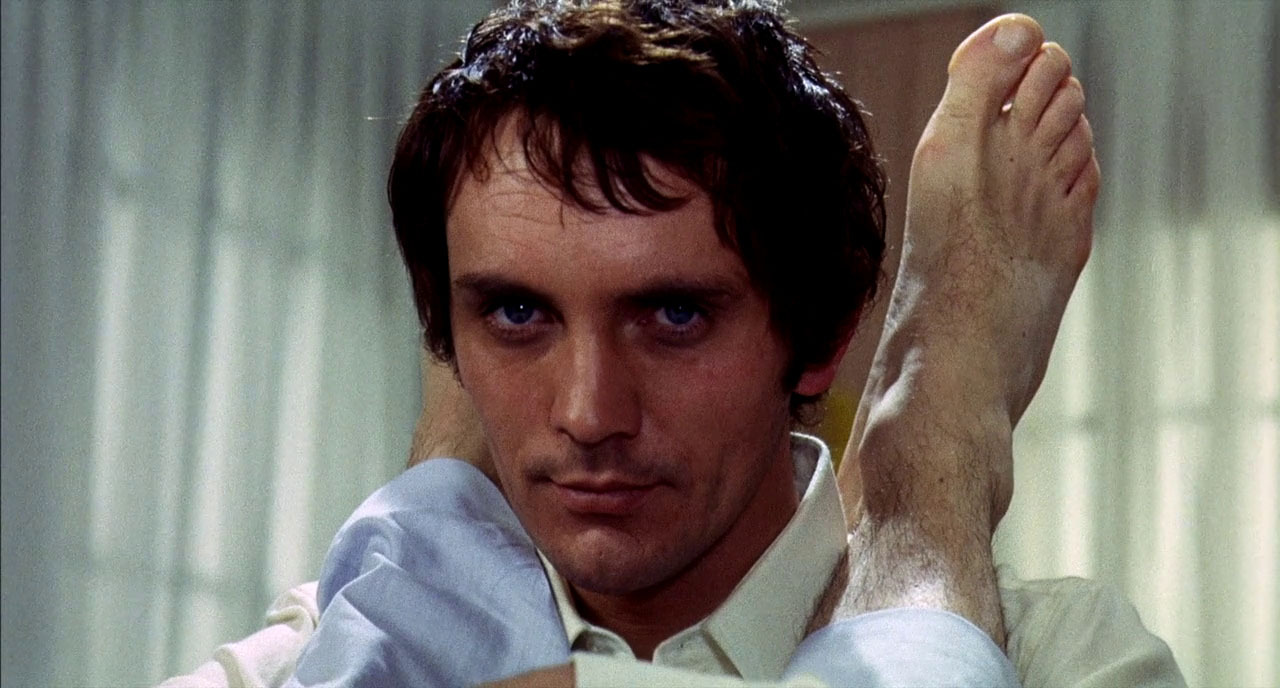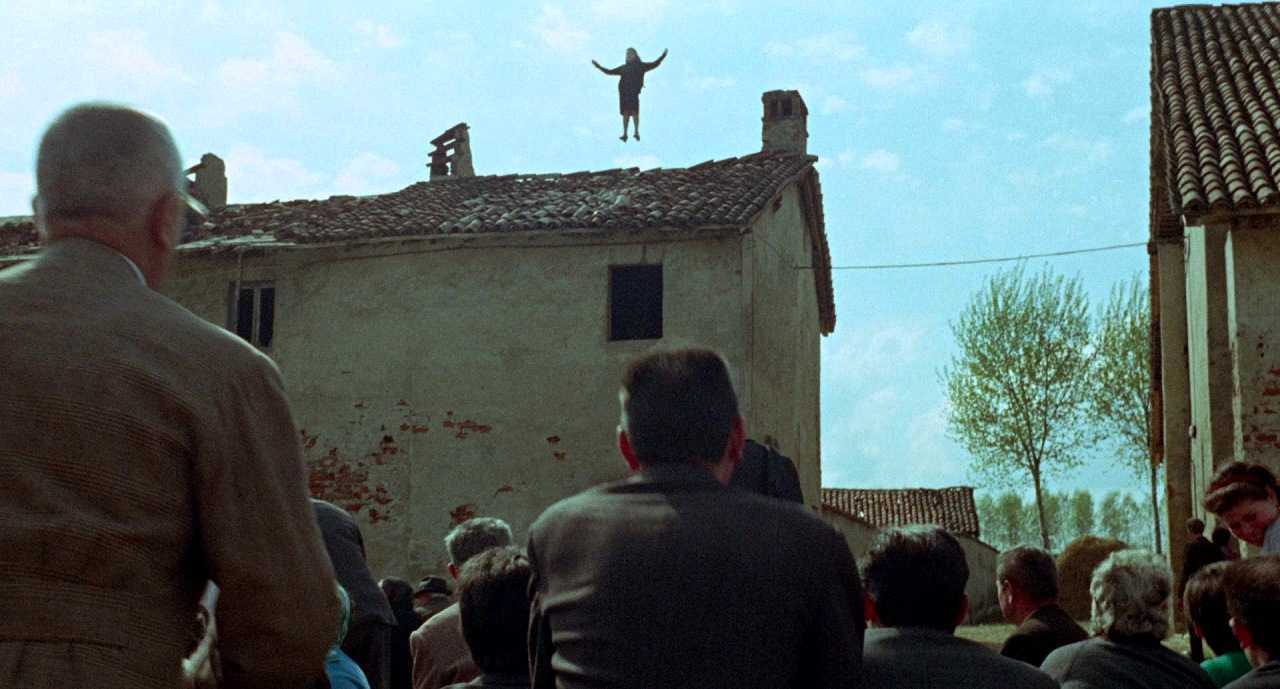Italy. 1968.
Crew
Director/Screenplay – Pier Paolo Pasolini, Producers – Manolo Bolognini & Franco Rossellini, Photography – Giuseppe Rizzolini, Music – Ennio Morricone, Music Director – Bruno Nicolai, Production Design – Luciano Puccini. Production Company – Aetos Produzioni Cinematografiche/EIA.
Cast
Terence Stamp (The Visitor), Silvana Mangano (Lucia), Laura Betti (Emilia), Massimo Girotti (Paolo), Andres Jose Cruz Soublette (Pietro), Anne Wiazemsky (Odetta), Ninetto Davoli (Angelino), Adele Cambria (Emilia)
Plot
A stranger appears and slots into the home of a wealthy industrialist in Milan. The stranger says little but proceeds to seduce everybody in the household, including the father, the mother, the son, the teenage daughter and the maid. Afterwards the stranger announces that he must go. In his absence, everybody feels that their lives are empty. Each tries to cope in a different way – the son Pietro tries to create a new form of art to fill the void inside himself; the daughter Odetta becomes catatonic and has to be hospitalised; the maid Emilia travels to a farm and sits waiting for a miracle, refusing to eat anything except nettles; the mother Lucia takes to picking up young men for random sexual encounters; while the father Paolo turns his factory over to the workers and strips off all his clothes to walk into the wilderness.
Italian filmmaker Pier Paolo Pasolini (1922-75) was a highly controversial figure. He was an avowed Communist during World War II and an open homosexual (the Communists expelled him after he was charged over a sexual dalliance with some of his pupils while working as a teacher). Pasolini was a published poet, a newspaper editor and novelist, before breaking into film as a co-writer on Federico Fellini’s Night of Cabiria (1957). His first film as director was Accatone (1961), which generated controversy due to its portrait of the life of a pimp. The works that Pasolini became most internationally renowned for were his adaptations of classics, which include Oedipus Rex (1967), The Decameron (1971) and The Canterbury Tales (1972), which often came with a frank sexual element.
Pasolini’s other films of genre interest include the strange and rather incomprehensible Porcile (1969), one story of which concerns the activities of a cannibal; Medea (1969) retelling the story of Jason and the Argonauts; his beautiful and erotic adaptation of Arabian Nights (1974); and the extremely controversial Marquis de Sade adaptation Salo or 120 Days of Sodom (1975), which was banned in a number of countries. Salo would be Pasolini’s last work – he was run over in his own car and killed by a male prostitute he had dallied with shortly after completing the film. Abel Ferrara’s Pasolini (2014) is a biopic that centres around the director’s last few days featuring Willem Dafoe as Pasolini.
Pasolini was often a contradiction. Despite being a stated atheist, he made several films about matters Christian, most notably The Gospel According to St Matthew (1964), which received the backing of the Catholic Church and is regarded as one of the finest works about the life of Christ, as well as the La Ricotta episode of the multi-director anthology RoGoPag (1965) concerning an actor playing a part in a film about The Crucifixion.

Similarly, Teorema is an allegory about what happens when the numinous touches the lives of ordinary people – for Terence Stamp’ stranger we are clearly meant to read the person of Jesus Christ. We see how the presence of religion changes lives – its absence leaving a crushing mundanity and feeling of emptiness, the need for those touched by it to express themselves in art, some totally withdrawing from the world, the maid painfully waiting for a miracle, the father being moved to abandon all his wealth and power and walk off naked into the wilderness. You are never entirely sure if Pasolini is on the side of the miraculous or is making a critique of it. Whatever the case, Teorema was condemned by the Catholic Church anyway.
Despite being the first of Pier Paolo Pasolini’s forays into genre material, Teorema does not always easily sit as a work of fantasy. Other films that have borrowed the idea of the miraculous/charismatic but mysterious visitor such as The Shout (1978), Brimstone and Treacle (1982), Man Facing Southeast (1986), That Eye, The Sky (1994), Francois Ozon’s Sitcom (1998), Takashi Miike’s Visitor Q (2001), Uwe Boll’s The Final Storm (2010), Outside Satan (2011), Borgman (2013) and Let Us Prey (2014) come steeped far more in overt fantasy or at least ambiguity about such.
It is not until the miracle scene near the end of the film – where maid Laura Betti is found suspended some thirty feet up in the air – that Teorema tips over into the overtly fantastical/miraculous. Otherwise, it is equally possible to offer an interpretation of Teorema that could regard Terence Stamp as a mysterious visitor with no necessary fantastical abilities. One criticism that might be made, certainly in comparison to these other abovementioned films, is that Terence Stamp’s Visitor is too ordinary. The changes he wreaks are only seen afterwards, we are never privy to the process of adulation that he causes in the family. Terence Stamp (the only Western name star that Pasolini ever worked with) has maybe a dozen lines of dialogue throughout and only ever radiates saintly wisdom and understanding.

There have been many differing interpretations given to Teorema. It has been seen in terms of Pier Paolo Pasolini’s own homosexuality – although it is worth pointing out that Terence Stamp’s visitor sleeps with all members of the household irregardless of sex. Sex merely becomes the means whereby the visitor’s transformation is conveyed. (In this regard, Teorema is surprisingly chaste compared to most of Pasolini’s subsequent films, which offer up copious nudity and simulations of sex. None of the sexual liaisons are ever depicted, although there are reports of longer uncut versions of Teorema in existence – but none of these have emerged and one suspects that this is simply rumour).
The other interpretation is of the film as a Marxist argument – the father is seen being dismissive of the bourgeois in an interview in the opening scenes, and the visitor as someone who tears apart the complacency of an upper-class family. In this interpretation, the end of the film is transformative with the final images being of the father throwing away all material wealth and possessions, even his clothes, and walking off into the wilderness.
Trailer here


